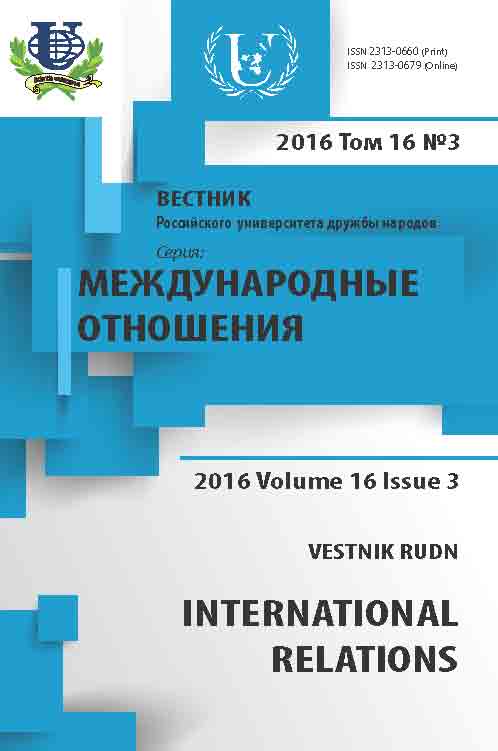Changing Priorities in Strategic Documents of Donor Countries in 2014-2016: Security, Sustainable Development Agenda and Other Factors
- 作者: Maximova A.V.1
-
隶属关系:
- Higher School of Economics
- 期: 卷 16, 编号 3 (2016): International Conflicts: Quo Vadis?
- 页面: 521-537
- 栏目: Articles
- URL: https://journals.rudn.ru/international-relations/article/view/14769
如何引用文章
全文:
详细
The article discusses driving forces behind the changing strategies of the bilateral donors of international development assistance. It considers the donors that have adopted their strategies in 2014-2016. The group comprises mainly traditional development actors, however a new European donor Poland and a reemerging donor Russia have also made it into the sample. To identify the changing narratives and potential driving forces behind them the strategies were analyzed in pairs: a strategy adopted in 2014-2016 and its predecessor. Based on the analysis four clusters of the potential driving forces were identified: new global development agenda, security concerns, economic interests and foreign policy considerations. The article demonstrates how donors are becoming more open about their security and political interests in provision of development aid. This trend is especially visible in countries such as the U.K., Japan, Russia, and Switzerland. Australia seems to prioritize the economic dimension of the mutual interest in development assistance. Finland, Germany and Poland are adhering to the global sustainable development agenda.
作者简介
Anastasiya Maximova
Higher School of Economics
编辑信件的主要联系方式.
Email: nastjamaksimova@gmail.com
Moscow, Russia
参考
- Bartenev, V.I. (2015). Svyazka "bezopasnost'-razvitie" v sovremennykh zapadnykh issledovaniyakh: ot dekonstruktsii k kontseptualizatsii [Security-development nexus in modern western research: from deconstruction to conceptualization]. Mezhdunarodnye protsessy, 3, pp. 78-97.
- Buzan, B., Waever, O. (2009). Macrosecuritisation and security constellations: reconsidering scale in securitisation theory. Review of International Studies, 35(2), pp. 253–276.
- Corbett, J., Dinnen, S. (2016). Examining recent shifts in Australia's foreign aid policy: new paradigm or more incremental change? Australian Journal of International Affairs, 70 (1), pp. 87-103.
- Degterev, D.A. (2012). Sodeistvie mezhdunarodnomu razvitiyu kak instrument prodvizheniya vneshnepoliticheskikh i vneshneekonomicheskikh interesov [International development assistance as an instrument to promote foreign policy and economy interests]. Vestnik MGIMO-Universiteta, 2, pp. 47-58.
- de Renzio, P., Seifert, J. (2014). South–South cooperation and the future of development assistance: mapping actors and options. Third World Quarterly, 35 (10), pp. 1860-1875.
- Dreher, A., Nunnenkamp, P., Schmaljohann, M., 2015. The Allocation of German Aid: Self-interest and Government Ideology. Economics & Politics, 27 (1), 160-184.
- Gray, P.A. (2015). Russia as a Recruited Development Donor. The European Journal of Development Research, 27 (2), pp. 273-288.
- Gulrajani, N. (2015). Dilemmas in Donor Design: Organisational Reform and the Future of Foreign Aid Agencies. Public Administration & Development, 35 (2), pp. 152-164.
- Kitaoka, Sh. (2016). Sustainable Development Goals and Japan's Official Development Assistance Policy: Human Security, National Interest, and a More Proactive Contribution to Peace. Asia-Pacific Review, 23 (1), pp. 32-41.
- Kokoshin, A.A., Bartenev, V.I. (2015). Problemy vzaimozavisimosti bezopasnosti i razvitiya v strategicheskom planirovanii v Rossiiskoi Federatsii: ot tselepolaganiya k prognozirovaniyu [Issues with the security-development nexus in Russia’s strategic planning: from goal setting to forecasting]. Problemy prognozirovaniya, 6, pp. 6-17.
- Larionova, M.V., Rakhmangulov, M.R., Berenson M.P. (2014). The Russian Federation’s International Development Assistance Programme: A State of the Debate Report. Institute of Development Studies (IDS). Series "Rising Powers in International Development". 88.
- Maksimova, A.V. (2015). Chto tsenim, to i otsenivaem: otsenka rezul'tativnosti sodeistviya mezhdunarodnomu razvitiyu [Treasure whata you measure: evaluation of the development assistance effectiveness]. Vestnik mezhdunarodnykh organizatsii: obrazovanie, nauka, novaya ekonomika, 1, pp. 56-79.
- Phillips, L., Jorgensen, M. (2002). Discourse Analysis as Theory and Method. SAGE Publications.
- Sachs, J. (2015). Achieving the Sustainable Development Goals. Journal Of International Business Ethics, 8(2), pp. 53-62.
- Vernon, P. (2015). What’s not to like about the UK’s new aid strategy? URL: http://www.international-alert.org/blog/whats-not-about-uks-new-aid-strategy#sthash.miHTX5St.Z7cWu6qr.dpbs (accessed 07.07.2016).
- Ware, H. (2015). Cosmopolitanism, National Interest, Selfishness and Australian Aid. Social Alternatives, 34 (1), pp. 51-57.
- Weldes, J. (1996). Constructing National Interests. European Journal of International Relations, 3 (2), pp. 275-318.








